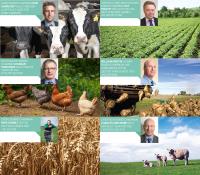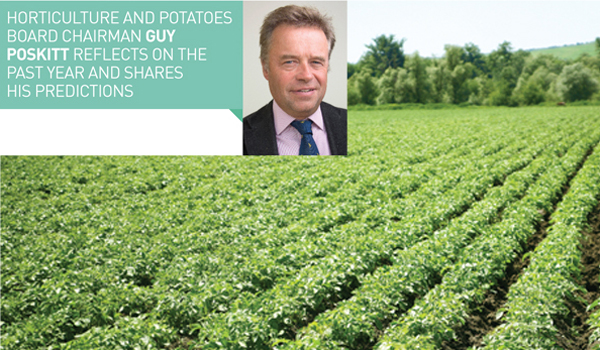I was delighted that Aldi became the first retailer to sign-up to our NFU Fruit and Veg Pledge – part of our Catalyst for Change work launched two years ago. The pledge set out to improve relationships and balance risk in the supply chain,
with retailers committing to building long-term, fair and transparent relationships with growers, and to commit to increasing the proportion of in season British-grown produce.
Aldi also added to our pledge asks with their own significant commitments. Let’s hope 2016 sees other retailers embracing the NFU pledge and offering their own commitments to best business practice.
Election years always add a bit of political excitement and none more so than this year. While the return of a Conservative government gave me hope of some stability and continuity for our industry, it hasn’t been without some big challenges: an in-out vote on Europe in 2017, our reliance on non-British workers still being wrongly sidelined by wider concerns on immigration, and cuts in Defra’s budget. Then, just two months in, the new government announced out of the blue a huge game-changer for this industry – the National Living Wage (NLW).
The NFU has worked to understand the NLW’s impacts on this industry and the figures are frightening. Basically, it has the capacity to make grower businesses unprofitable within a few years of its introduction, and the mitigation measures government offered in the summer budget barely scratch the surface to soften the blow.
The NLW is set to increase seasonal worker wages by some 35% between 2016-2021 – a lot higher than the 2-2.5% annual rate of wage inflation reasonably expected before the summer. These proposed increases are unprecedented.
2015 around the sectors...
 Read the thoughts of our board chairmen across the following farming sectors:
Read the thoughts of our board chairmen across the following farming sectors:
We support a living wage for our workers, but are hugely concerned about how our businesses are going to afford the
rates proposed by government. This has been a big area of work for the NFU since the announcement and that’s set to continue through to 2016.
Summer was spent visiting growers as part of our Catalyst Revisited project to see how things really are out on farms. I thank the many growers I visited for their time and openness. It was good to see the situation has improved over the past two years with many suppliers now having long-term arrangements with their customers. The benefits of the Groceries Supply Code of Practice and its adjudicator were also welcomed in all sectors.
However, the job is far from complete; growers still feel the current trading environment is a battlefield with them on the
weaker side. A worrying consequence of this is that imports of fruit and vegetables on supermarket shelves are now at record high levels as British growers cut back on home production – imports increased by an alarming 664,000t between 2010 and 2014.
Looking ahead to 2016, the retailers’ race to the bottom has to stop if we are to be left with a viable UK horticulture and potatoes industry, and we will be lobbying hard on this issue.
We hope a leaner restructured AHDB will allow more of our money to be spent on research and development in 2016 – the challenges with ever increasing loss of pesticides is huge.
Before we know it the real impact of living wage will be upon us and it will be interesting (in a ‘leaping into the unknown’ kind of way) to see how this all works out.
Any sectors that can automate will do so, but in many areas of horticulture this is not possible, and leaves two alternatives, which are increased imports or increased prices – for me a living wage has to be supported by a living price.
I have decided not to stand for re-election as horticulture and potatoes board chairman in March, as I believe you need change in these roles and I need to refocus on the family business. I hope my successor enjoys the job as much as I have.
